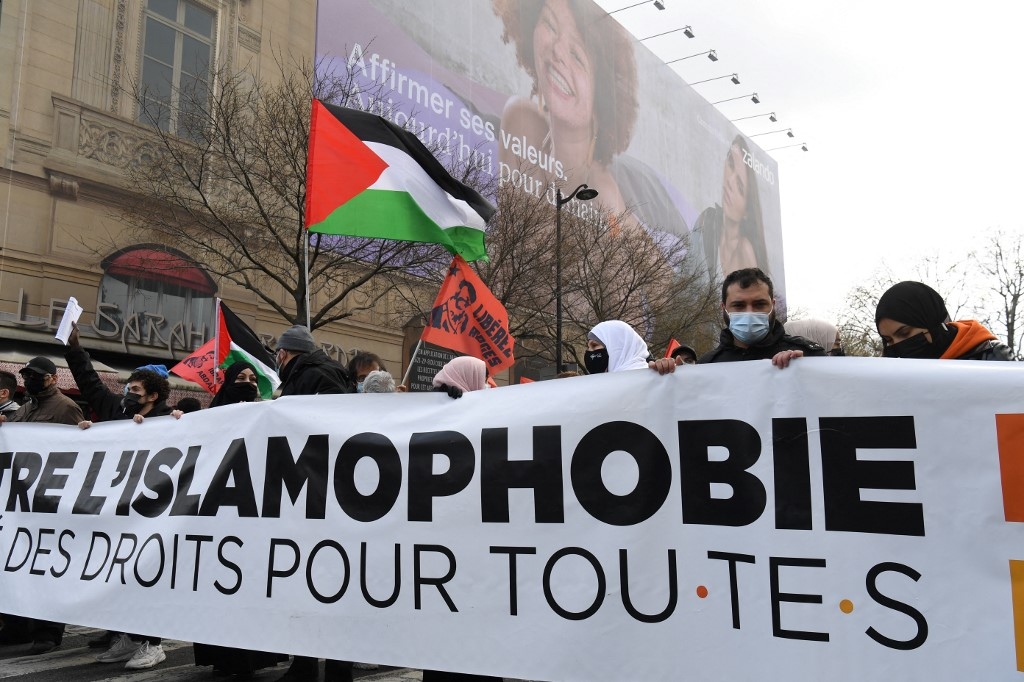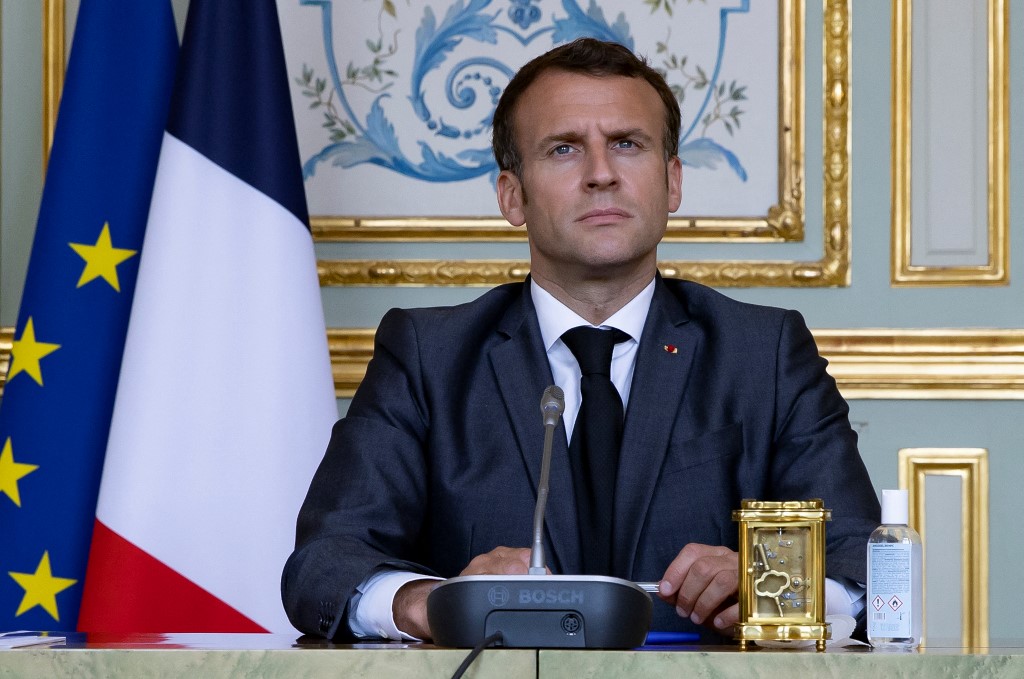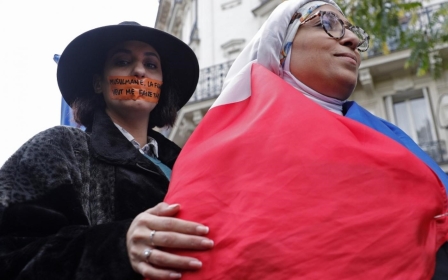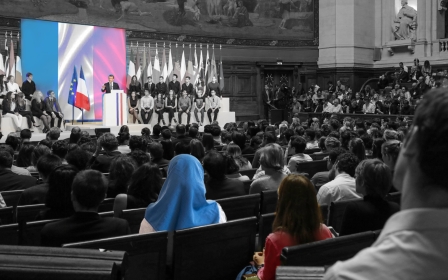How France wields 'Islamo-leftism' as a tool to silence critics

In the infinitely creative deployment of French Islamophobia, the latest campaign to purge academia, politics, culture and society of the alleged cancer of “Islamo-leftism” marks a new escalation in the government’s ever-worsening and systematic attacks on civil liberties. This time, academic freedom of thought, speech and research are being targeted.
The higher education ministry’s attempt to launch a McCarthyist operation across French academia - with the goal of censoring “Islamo-leftism”, separating “research” from “activism” and “science” from “politics” - represents an unprecedented effort by political authorities to control academic research and debate.
In France today, sadly, only fear and distrust of Muslims can aggregate a voter bloc covering the political spectrum
Regardless of its origins, the term has become invective for accusing critics and opponents of complacency over, or even complicity with, “radical Islamism” and jihadist terrorism. President Emmanuel Macron’s legislation against “Islamist separatism”, renamed as a project to “strengthen the principles of the Republic”, had already aimed to severely restrict academia, with a clause stating that academic freedoms must be exercised “with respect for the values of the Republic”.
More alarmingly, the concrete tools - both rhetorical, such as accusations that anti-racism activists “incite hatred” against France or “legitimise terrorist attacks”, but also legal, such as the invention of new crimes like “separatism” - and the context, with high levels of national hysteria and discrimination against Muslims, have been assembled to facilitate the banning, censoring and criminalising of critics and dissenters.
Many areas of academia are being explicitly targeted by Macron’s reactionary government - an authoritarian state worried about the emergence and success of genuinely critical and progressive thinking in academia. The targets are various: postcolonial studies, imperial studies, race studies, gender studies, intersectionality and many others. Even American campuses are viewed as a threat.
Drift towards autocracy
These and more are now being accused at the highest levels of the state of “fracturing the republic”, turning its “children” against their own country, “corrupting” society, provoking “separatism”, and in general constituting an existential threat to France.
Distrust of free intellectual life and the search for scapegoats have always been structural features of fascist thought. Far from being a blunder or an anomaly, this latest witch hunt is part of the already long history of France’s drift towards autocracy, illiberalism and a national security state. Nicolas Sarkozy’s presidency inaugurated a major rightwards shift in French politics and culture, which ultimately led to the mainstreaming of the rhetoric, themes, discourse, mindset, ideologies and policies of the identitarian far-right.
National Rally leader Marine Le Pen has suggested that she could have written Interior Minister Gerald Darmanin’s anti-Islamism policy. It is increasingly difficult to see major differences between Macron’s government and the far right. When it comes to repressing Islam and Muslims, the government is now often to the right of Le Pen, as seen when Darmanin mocked her during a high-profile debate for no longer calling Islam a problem. The Islamophobic consensus even includes leftist parties.
Research on the emergence and propagation of the term “Islamo-leftism” shows its origins and persistence in the far-right and ultra-conservative right, including the daily Le Figaro, one of commentator Eric Zemmour’s homes. But the deliberately stigmatising and accusatory term cuts across party lines, helping to turn entire portions of the pseudo-laicist left, such as Charlie Hebdo, into raging Islamophobes. It helps make Islamophobia even more of an ideological backbone of the country, from the far left to the far right.
Despite occasional tactical alliances and convergent struggles between the far left and Islamist groups, however, there is not a single “Islamo-leftist” or jihadist sympathiser occupying an academic teaching or research position in the French higher education system. Countless open letters from scores of academics have refuted such accusations, as have university presidents, top research institutions and respected scholars.
Pandering to voters
Without a shred of evidence to support this scaremongering, what is this latest episode of French hysteria about? Besides creating another false threat, this urban legend is an easy way for Macron to pander to the Islamophobic majority of the French electorate. In France today, sadly, only fear and distrust of Muslims can aggregate a voter bloc covering the political spectrum, from the xenophobic, nationalist far right to the Republican laicist left, in a way that no other campaign can.
Additionally, the Macron government and conservative media use it to try to discredit and defame the leftist opposition, essentially accusing them of intellectual and ideological complicity with jihadists who have spilled French blood.
Those attacked most frequently and slandered most violently are not “Islamists” or even Muslims, but rather non-Muslim intellectuals and academics critical of government policies: opposition leaders, especially Jean-Luc Melanchon of Unsubmissive France; independent journalists and leftist media vocally critical of Macron, such as Mediapart; leftist student unions; “radical” feminist groups; and anti-racist groups fighting against discrimination and neo-colonialism, such as the Collective Against Islamophobia and Black Lives Matter.
This conspiracy theory is an attempt to find scapegoats and create a diversion from the real problems and failures of the Macron government, including - but not limited to - the twin pandemic/unemployment crisis and its abject mismanagement.
“Islamo-leftism” is not just a rhetorical weapon of mass dissuasion and intimidation. More gravely, given the nature of the accusations it carries, it indicates a will on the part of this government to find pretexts to criminalise and censor as many critics, dissenters and opposition forces as possible - certainly not limited to those within academia.
Calls for intersectionality
This all-out campaign to discredit and dismantle the political and cultural left is happening at a very specific moment, as entire segments of the left and far left have been joining new anti-racist and neo-feminist movements, making calls for intersectionality and the convergence of struggles tangible - most notably during the November 2019 march against Islamophobia in Paris, a key moment whose success provoked heinous and slanderous reactions from conservatives and neo-Republican reactionaries.
The “Islamo-leftist” campaign intends to sabotage this synergy. The simultaneous targeting of these various groups is not random or coincidental, happening just as these new grassroots movements and intellectual fields of research are (belatedly) starting to get some traction in French academia and larger society, forging new conceptual tools and organisations to enable oppressed minorities to think about, and fight against, multiple forms of oppression.
The hysteria surrounding 'Islamo-leftism' is a sign of the moral panic of France’s white privileged and largely racist ruling elites
“Islamo-leftism” is thus wedge politics at its worst. The hysteria surrounding it is a sign of the moral panic of France’s white privileged and largely racist ruling elites, who are seeing the significant advances of increasingly large numbers of ethnic, religious and sexual minorities in media, academia, the arts, business and now politics.
Their problem is that the dominant order - capitalist, patriarchal, sexist, racist, colonial and then neocolonial - from which they have always benefitted, as well as the foundational myths legitimising that order, are crumbling amid combined assaults from disciplines such as postcolonial studies and rising activist minorities who are finally becoming social agents and political actors. That, too, bothers many.
The net result of all of these distinct, yet increasingly merging, trends is to thoroughly deconstruct, expose and challenge all of the class, racial, gender, sexual and religious hierarchies of domination that have served so well the ruling bourgeois classes. It is thus no surprise that white ruling elites would try to push back against these tectonic trends, aiming to preserve their disappearing world and petty domination a little longer.
The views expressed in this article belong to the author and do not necessarily reflect the editorial policy of Middle East Eye.
Middle East Eye propose une couverture et une analyse indépendantes et incomparables du Moyen-Orient, de l’Afrique du Nord et d’autres régions du monde. Pour en savoir plus sur la reprise de ce contenu et les frais qui s’appliquent, veuillez remplir ce formulaire [en anglais]. Pour en savoir plus sur MEE, cliquez ici [en anglais].







